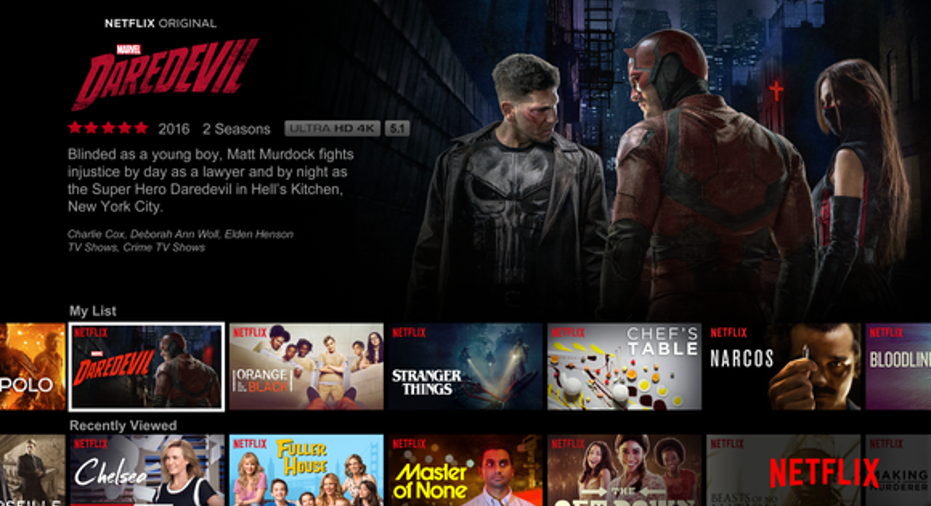Netflix Competitors Are Closing the Gap: Time to Panic?

Image source: Netflix.
According to a recent survey by UBS, competitors such as Hulu and Amazon.com (NASDAQ: AMZN) are rapidly closing in onNetflix (NASDAQ: NFLX) in terms of customer satisfaction. The news comes at a very particular time, as Netflix delivered disappointing user growth last quarter. Should Netflix investors be worried?
A horror movie?
Netflix is performing well when it comes to customer satisfaction, based on the UBS survey; 59% of subscribers say they are "very satisfied" with the service as of June 2016. However, the figure has remained mostly stable over the past couple of years, while competitors such as Hulu and Amazon are benefiting from improving customer satisfaction.
According to the survery, 53% of the respondents said that they were very satisfied with Hulu as of June 2016, from 49% in Nov. 2015. Satisfaction scores for Amazon have consistently increased over the past several years, from 44% of respondents being very satisfied with the service in Nov. 2014 to 48% in May 2015, then again to 51% in Nov. 2015, and finally rising to 58% in June of this year.
Adding to the negativity, Netflix announced disappointing user growth during the second quarter of 2016. The company gained 1.7 million new members during the quarter, a material deceleration from 3.3 million net additions in the second quarter of 2015. The figure was also substantially below the company's own guidance, as management was expecting 2.5 million new members in the quarter.
This is understandably raising some eyebrows among Wall Street analysts and investors in Netflix stock. The company has delivered tremendous growth over the past several years by leveraging on its leadership position in online TV. Competitors such as Hulu and Amazon are now reducing the gap in terms of customer satisfaction, while at the same time Netflix is reporting decelerating growth. If Netflix is losing customers to the competition, this could be a sign of increasing difficulties in the coming years.
Buy Netflix and chill
Netflix operates in a dynamic growth industry, and investors need to pay close attention to the always-evolving competitive landscape in the sector. Nevertheless, there are reasons to believe that the company is well positioned to continue delivering substantial growth in the years ahead, even in the face of increasing competitive pressure.
Management believes that the slowdown in growth last quarter was due to a one-time increase in prices, as opposed to the permanent impact from increasing competition. Netflix implemented a price increase for new subscribers two years ago, while long-tenured customers were "grandfathered" by retaining the lower price over two years. The company started un-grandfathering those customers in the U.S. in April, which provoked an unexpected increase in the churn rate during the second quarter.
The company specifically said in its letter to shareholders for the second quarter that gross additions -- meaning new members -- were in line with expectations, but the problem was that many existing customers cut their subscriptions due to the price increase. Netflix experienced a similar increase in its churn rate in Canada during the period, the company is also un-grandfathering members in Canada, but there is no recent increase in competition in that country. This arguably shows that the deceleration in user growth was due to the price hike and not because of rising competition from Amazon and Hulu.
From a long-term point of view, there is no reason to believe that competitive pressure will necessarily derail Netflix from its growth trajectory. To begin with, the online streaming industry should offer plenty of opportunities for Netflix, Amazon, Hulu, and other players to do well over time.
Over 1 billion pay TV subscribers around the world are expected to migrate to online TV over the coming years, and online TV services are generally much more affordable than pay-TV options. Many customers will probably subscribe to multiple streaming services, so online TV is not necessarily a zero-sum game in which only one company takes all the customers.
Besides, Netflix has the competitive strength to protect the business from the competition. The company has the first-mover advantage in the industry and one of the most popular brands in the sector. Netflix is aggressively expanding on a global scale. Even if international expansion can be expensive, the company is positioning itself as the first mover in online TV in many emerging markets, where online TV still has enormous potential for expansion over the long term.
In addition, original content is a key differentiating factor for Netflix. The company is planning to release 600 hours of original content this year, and management wants 50% of its library to be original content in the future. This has important advantages for Netflix, not only in terms of profitability but also when it comes to attracting and retaining subscribers.
Growth attracts the competition, so it's only natural to expect increasing competitive pressure in online TV in the years ahead. However, the industry should offer plenty of opportunities for multiple players to do well over time, and Netflix comes second to none in terms of competitive strength in the business. With this in mind, the long-term growth story in Netflix stock looks pretty much intact.
A secret billion-dollar stock opportunity The world's biggest tech company forgot to show you something, but a few Wall Street analysts and the Fool didn't miss a beat: There's a small company that's powering their brand-new gadgets and the coming revolution in technology. And we think its stock price has nearly unlimited room to run for early in-the-know investors! To be one of them, just click here.
Andrs Cardenal owns shares of Amazon.com and Netflix. The Motley Fool owns shares of and recommends Amazon.com and Netflix. Try any of our Foolish newsletter services free for 30 days. We Fools may not all hold the same opinions, but we all believe that considering a diverse range of insights makes us better investors. The Motley Fool has a disclosure policy.



















